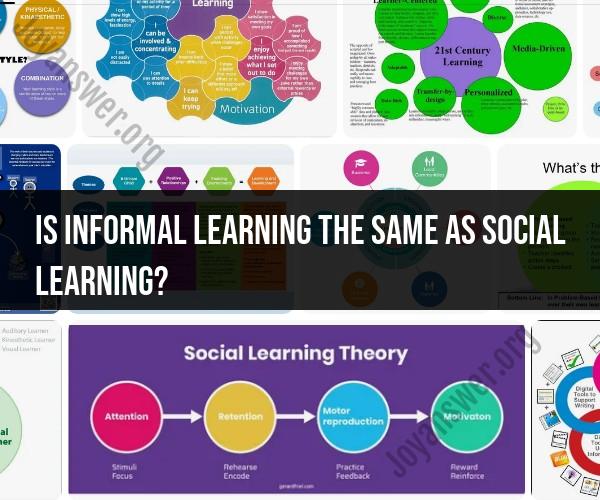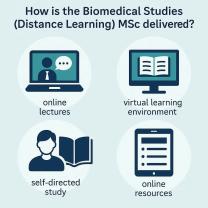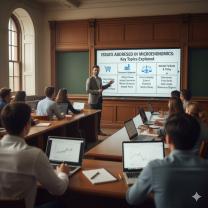Is informal learning the same as social learning?
Informal learning and social learning are related concepts, but they are not the same. They have distinct characteristics and emphasize different aspects of the learning process:
Informal Learning:
- Definition: Informal learning refers to the process of acquiring knowledge and skills in a self-directed, unstructured, and often unintentional manner. It occurs naturally in everyday life outside of formal educational or training settings.
- Individual-Centric: Informal learning is primarily focused on individual learners who take the initiative to acquire knowledge or skills through various means, such as reading, observation, experimentation, or hands-on experience.
- Self-Directed: Learners in informal learning situations are in control of what, when, and how they learn. They set their own learning objectives and decide how to achieve them.
- Context: Informal learning can take place in diverse contexts, including reading books, watching videos, engaging in hobbies, exploring new topics, or problem-solving in real-life situations.
- Structured vs. Unstructured: Informal learning is often unstructured and does not follow a predefined curriculum. It is driven by the learner's interests and needs.
- Examples: Reading a book for pleasure, learning to cook by experimenting with recipes, or picking up a new language through immersion in a foreign country are examples of informal learning.
Social Learning:
- Definition: Social learning, on the other hand, emphasizes the role of social interactions and relationships in the learning process. It occurs when individuals learn from one another through observation, communication, and collaboration.
- Social Interaction: Social learning involves interactions with others, such as peers, mentors, colleagues, or experts. These interactions can occur face-to-face or through digital platforms.
- Observation and Imitation: A key aspect of social learning is observing others and imitating their behavior, actions, or knowledge. It often involves modeling the actions or attitudes of role models.
- Feedback and Reflection: Social learning encourages feedback and reflection. Learners receive feedback from others, which helps refine their understanding and skills.
- Context: Social learning can occur in various contexts, including classrooms, workplaces, online communities, and mentorship programs.
- Structured or Guided: While social learning can be informal and spontaneous, it can also be structured, as in a classroom setting where a teacher facilitates learning through discussions, group work, and peer interaction.
- Examples: Participating in a group discussion, receiving training from a mentor, attending workshops or seminars, and collaborating on a team project are examples of social learning.
In summary, while informal learning can encompass self-directed and unstructured learning activities, social learning specifically highlights the role of social interactions, observation, and communication in the learning process. Social learning often occurs within the context of informal learning, but it can also take place within formal educational settings. Both types of learning are valuable and can complement each other in a well-rounded learning experience.
Exploring Informal Learning vs. Social Learning: Is There a Difference?
Yes, there is a difference between informal learning and social learning. Informal learning is any type of learning that takes place outside of a formal educational setting. It can be intentional or unintentional, and it can happen anywhere and at any time. Social learning is a type of informal learning that occurs through interaction with others.
Informal Learning and Its Connection to Social Learning
Informal learning and social learning are closely connected. In many cases, informal learning occurs through interaction with others. For example, you might learn a new skill by watching a friend or colleague do it, or by talking to someone who knows more about the topic than you do.
Social learning can be more effective than informal learning because it allows you to learn from the experiences of others. For example, if you are learning how to code, you can learn from the mistakes of other coders and avoid making the same mistakes yourself.
Distinguishing Informal Learning from Social Learning
One key difference between informal learning and social learning is that informal learning can also occur independently. For example, you can learn about a new topic by reading a book or watching a video on your own. Social learning, on the other hand, always involves interaction with others.
Another key difference is that informal learning is often unintentional. For example, you might learn something new by overhearing a conversation or by simply observing the world around you. Social learning, on the other hand, is usually more intentional. You are actively seeking out information and feedback from others.
Examples of Informal Learning and Social Learning
Here are some examples of informal learning and social learning:
- Informal learning:
- Reading a book about a topic that interests you
- Watching a documentary on YouTube
- Experimenting with a new cooking recipe
- Visiting a museum or art gallery
- Traveling to a new place and experiencing a different culture
- Social learning:
- Having a conversation with a colleague about a new work project
- Working on a group project with other students
- Attending a conference or workshop
- Joining a club or online community related to your interests
- Mentoring someone or being mentored by someone more experienced
Conclusion
Informal learning and social learning are both important parts of our lives. They can help us to grow and develop as individuals. By understanding the difference between these two types of learning, we can take advantage of both to learn new things and improve our skills.













